"The Haunted Online"
STORY
Generation Z has grown up in an unprecedented era of the World Wide Web — thanks to the Internet, we've been able to learn and grow in all sorts of new and fun ways. In the same vein, though, the early 2000s could often be a very unrestricted time online, and some grew up immersed in content that was too mature for them.
This is a reflection of my own childhood online, in which I accidentally stumbled across a surplus of disturbing content and became addicted, working day and night to desensitize myself.


CHARACTERS
Though this story is entirely my own experience, I've split myself into two characters to distinguish my different motivations. You will meet "Kat," the nine-year-old me, and "Katelyn," the (almost) fully-realized adult.
ORIGINS
I began this Internet reflection after stumbling upon a TikTok trend in which young people were purposefully trying to watch the most "traumatic" content they could find online, bragging about how it didn't affect them. I winced upon this discovery, as it sounded all too familiar to my own childhood. You can read this project's origin in The Michigan Daily here.
All images created by Katelyn Sliwinski. Writing 220 Gateway Project, 2023.
MEET THE CHARACTERS
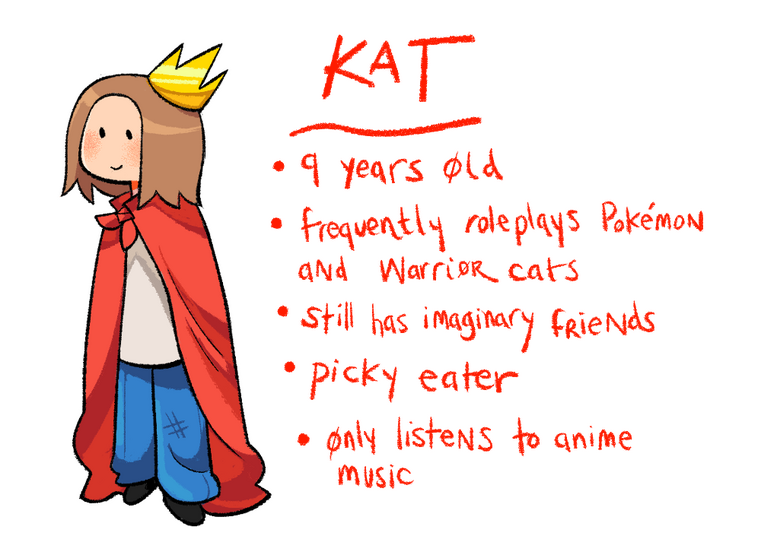
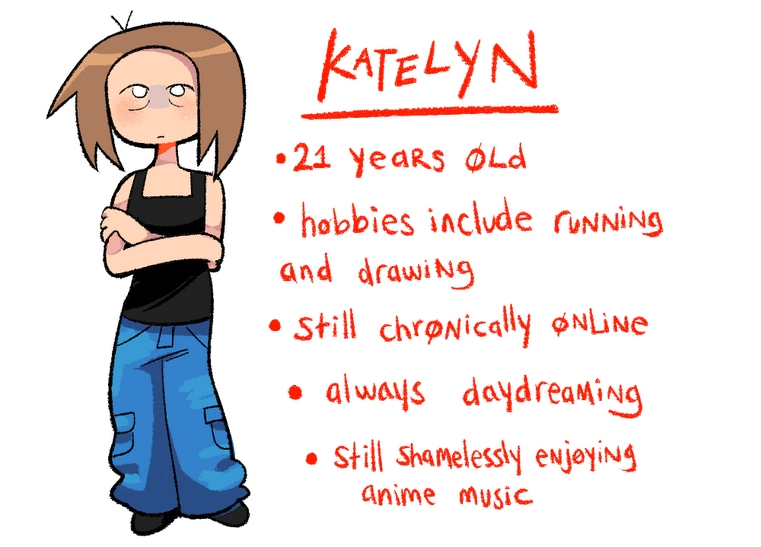
Story

My name was Kat. I picked the name for myself in the fourth grade, bored by the simple femininity of Katelyn. I liked the edge it had. It made me feel like a cartoon character, something I cared a great deal about. To accompany this desire to feel like a cartoon, I’d wear all sorts of fun hats, too. I’d pretend they talked to me, take pictures with them, draw them (and myself) as characters — classic kid stuff. I look at Kat’s unwavering imagination with fondness. She sure knew how to have fun.I was a good kid. A lovely, imaginative nine-year old, suddenly feeling excited about my teenage years, wanting to seem older and smarter than I actually was. I spent all my time obsessing over reading, drawing, watching TV, and playing video games, and this eventually led me toward an addiction to the then-developing video-sharing platform YouTube.
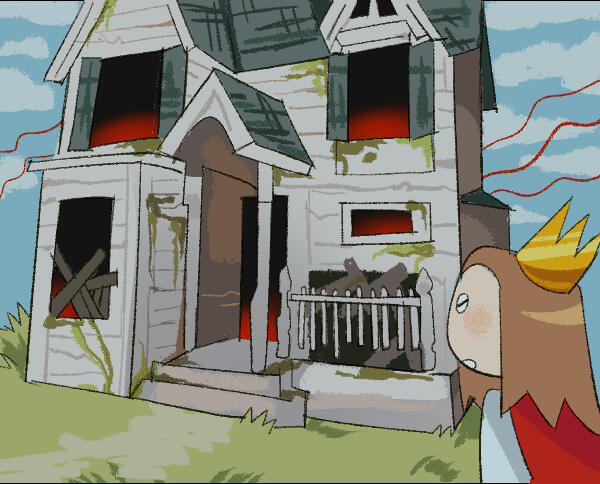
YouTube was paradise for a kid with an overactive imagination such as myself — I found endless videos made by fans of the same cartoons as me, creating animations and songs out of love for the medium. I wanted to be just like them. When I wasn’t online, I was drawing and aspiring to animate just like the videos I’d seen online. I had my own original characters for “Warrior Cats”, “My Little Pony,” “Pokemon”, and more, spending every minute imagining them in cool scenarios similar to those I’d seen on YouTube.Over time, this led me to weird corridors. I’d occasionally come across content that made me feel strange, a budding flame of unease permeating my stomach. A video of a Pokemon character, a ten year old child, with an emphasis on the underside of her skirt. A video of Pinkie Pie from “My Little Pony” reimagined as a crass, drug-addicted prostitute. Blood pouring from her intimate regions, an obnoxious reference to her period. I had little concepts of what these things all meant; my head spun, but underneath it all, I felt grown up.I was entranced. A simple YouTube video of a “My Little Pony” song could lead me down a rabbit hole of more mature content of the beloved kids' show. At first, I was terrified - but after repeated exposure, I couldn't stand to watch the real show. I grew accustomed to the bloody, violent, profane festival of YouTube content. I wanted more.
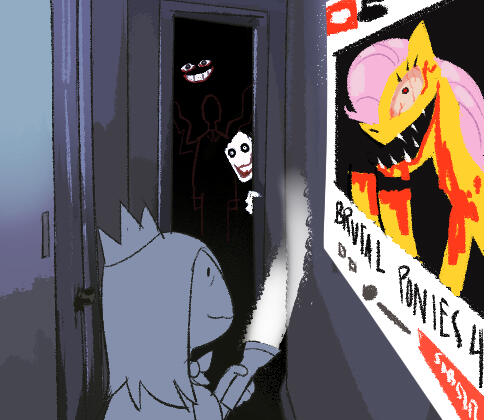
The internet was not just something to do; it was a place I went to, a house of my own that my parents couldn't see. They knew the obvious dangers of the internet, but not the tricks I'd learned to sneakily find things I wasn't supposed to.Each day, I’d continue to traverse into the haunted house. I’d grin and cackle at how easy it was to come across mature content; I was shown what semen was for the first time on Minecraft, when a server host asked me if I knew what it was. Of course I do, I told him. I’m in college. I was nine; I had no idea. He took me to a phallic statue he’d created, making clear demonstration of the phenomenon. At the time, it was funny to me.
Looking back, I grimace. How old was he? Did he catch on to the fact that I’d clearly lied about my age? Could things have ended worse for me had I continued to interact with him? Yes, it’s just a penis in Minecraft, but it’s the principle. A stranger online got me curious about what it must really be like — I don’t feel the need to elaborate further on where that led me.

By the time I was twelve, things had gotten out of hand. I was looking up the most disturbing films of all time, attempting to watch them without looking away. I watched “The Human Centipede” on my way to swim practice in the back seat of my mom’s Ford Explorer in silence. I watched “Cannibal Holocaust” after my baby cousin’s birthday celebration, locking myself away to endure on-screen torture. I was glued to my screen, impressed at my abilities.Yet the real world had yet to recognize me for these skills. One fateful day, my middle school friends invited me to a sleepover. Before we went to bed, we decided to put on a movie. My friend chose “Cyberbully,” a 2011 film that gained brief notoriety for its discussion of social media and its contribution to the teen mental health crisis.In the film’s climax, main character Taylor attempts suicide after frequent encounters with cyberbullies online. In a fit of panic, she scrambles to open a pill bottle and fails, watching them scatter to the ground. She sobs. This pivotal moment had my twelve-year-old peers nearly in tears, yet I had failed to notice — I began to laugh hysterically at the scene. I mocked Taylor’s tone of voice as she sobbed. I was cruel and edgy, desensitized from my years of living in the haunted house.
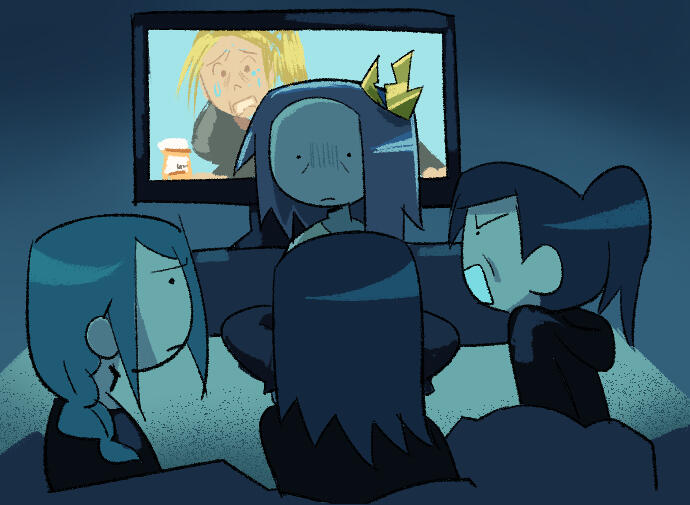
Understandably, my friends lashed out at me when I laughed. As I began to grasp the weight of their emotions, they threatened to kick me out of the sleepover. Tears rushed to my eyes in a mixture of shame and confusion. I suddenly considered the possibility that something was wrong with me, that my years online have perhaps caused me to lose my human empathy. I knew I had to change, but I was scared; who would I be without my haunted house?
“Did it harm me?” Yes, of course it did. Everything harms us all the time. Humans are weak, and this is okay. But what if I could have done something to change it?Would I? I'm not really sure. I love me how I am today, and I think these online experiences have made my days on earth a lot more interesting.But I talk to my baby cousin, six years old. He's now interested in graphic horror games that scared the life out of me when I was in middle school. He said he found out about them through Roblox. That sight puts me off, despite my self-assurance that I am okay today.What if he doesn't turn out okay? Is the internet to blame? Do I hold responsibility to keep him away from that rabbit hole, knowing what I know now? It scares me.I can see little me, little Kat, slipping into these online pits of madness, and it feels impossible that she'd turn out okay. She's getting addicted to gore. There's nothing I can do to stop that, nothing my parents can do either.They don't know the online world as well as Kat does. My aunt and uncle don't know that world the way my cousin does. We have a new sense of agency compared to our predecessors, thanks to the internet. It's amazing; it's unprecedented. It can be scary.I see things differently now. I look out for warning signs, red flags, every time I'm online. I don't think I'm alone in that; I think it's quite common with this generation. I’ve seen a lot of discussion of old Nickelodeon shows, for example, in which Gen Z can point out examples of perversely-imposed fetish content in the shows we once loved. My friends and I have spent some time rewatching “iCarly,” for example, and are often uncomfortable at the heavy presence of feet within the show — it’s an unspoken piece of knowledge, a wince we share each time we encounter it. Through moments like these, I realize I am not the only one who was exposed too young to mature content; we have these shared understandings and fears about the internet and its effects.I see kids falling into the same pits I did; for a moment in time, it was even trendy. I saw thousands of young people, particularly young women, watching films like “Megan is Missing” in which assault and torture is graphically depicted for seemingly no reason at all. They stood proud online saying that it didn’t affect them, that it’s a poorly made movie that’s not scary at all. They ask their TikTok followers for more graphic films they can watch. They remind me of myself; they inspired me to reconsider my upbringing in the first place. I grit my teeth as I watch them crawl down the rabbit holes, but they really look like they’re having fun — just like I did. Sure, I can hope they crawl out of the rabbit hole and gain some humanity, but in the meantime, I suppose at least it’s good they’re finding community?Because that’s the thing — community. Harm, desensitization, stranger danger — all of these are real consequences of the World Wide Web, but I can’t help but be grateful for the internet despite all I’ve gone through. So many times, particularly in my adolescent years, I felt completely alone and inhuman, but I always could retreat to the web. Nobody knew me, nobody needed to know me; I could simply lurk, watching humanity and its creations from a distance. Good, bad and ugly, I’ve grown attached to the internet and all of its flaws.Regardless of what criticisms or fears I have, I can’t stop falling back on this conclusion: I love the internet. Yes, the years of simulated violence and horror stuck with me, but so, too, did my tender adoration for family-friendly online animation. As an adult, I can still shed tears watching “My Little Pony;” perhaps I’m not broken or desensitized after all. Or, perhaps we all are in our own ways. That’s okay — humanity is messy, brutal, and horrific — and we should talk about it.

